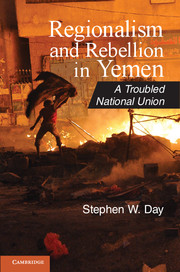Book contents
- Frontmatter
- Contents
- Tables
- Maps and Photos
- Preface
- Acknowledgments
- Abbreviations
- Chronology of Modern Yemeni History
- Glossary of Names of Key Political Figures
- Introduction
- 1 Understanding the Regional Divisions of Yemen
- 2 Two Revolutions, Two Republics
- 3 Salih Family Rules and the Sanhan Tribe
- 4 Unity in Name Only
- 5 The Spoils of Civil War
- 6 A Regime in Control?
- 7 Political Eruptions after 9/11
- 8 The Return of Yemeni Regionalism
- 9 Yemen’s Political Meltdown
- Conclusion
- Appendix
- Bibliography
- Index
6 - A Regime in Control?
Published online by Cambridge University Press: 05 July 2012
- Frontmatter
- Contents
- Tables
- Maps and Photos
- Preface
- Acknowledgments
- Abbreviations
- Chronology of Modern Yemeni History
- Glossary of Names of Key Political Figures
- Introduction
- 1 Understanding the Regional Divisions of Yemen
- 2 Two Revolutions, Two Republics
- 3 Salih Family Rules and the Sanhan Tribe
- 4 Unity in Name Only
- 5 The Spoils of Civil War
- 6 A Regime in Control?
- 7 Political Eruptions after 9/11
- 8 The Return of Yemeni Regionalism
- 9 Yemen’s Political Meltdown
- Conclusion
- Appendix
- Bibliography
- Index
Summary
In the spring of 1997, President Salih felt confident enough about his grip on power that he proceeded on schedule with Yemen’s second parliamentary elections, exactly four years after the first elections. Unlike the weak showing of the president’s party in 1993, the GPC swept the voting in a convincing victory on April 27, 1997. According to the official results, the president’s party gained 62 percent of the parliamentary seats. But unofficially, the GPC controlled up to 70 percent. From the outset the GPC did not want an overwhelming majority of parliamentary seats like the older ruling parties of Egypt, Syria, and Iraq, which often received 90 percent or more in national parliamentary elections. In Yemen, the GPC needed to prove there was still a viable opposition, in order to justify its claim to democratic rule. It also did not want the burden of responsibility that would come with a 90 percent majority.
The 1997 election was hardly a real pluralist contest. Unlike the election in 1993, the GPC controlled all public funds, the government media (which provides the only source of radio and television broadcasts in a country where more than half of the population is illiterate), and most important, the country’s Supreme Elections Committee (SEC). The GPC’s control of the SEC meant there was no independent supervision of Yemen’s second election. This created problems from the beginning of voter registration in the summer of 1996. The problems were so severe that in the fall of 1996 every opposition party, including Islah, united in calling for a boycott unless the SEC was reformed and voter registration corrected. After the GPC made a few concessions to split the opposition, Islah and the small Nasserite and Ba‘th parties agreed to participate in the election, while the YSP and a few smaller opposition parties continued to boycott.
- Type
- Chapter
- Information
- Regionalism and Rebellion in YemenA Troubled National Union, pp. 162 - 194Publisher: Cambridge University PressPrint publication year: 2012



